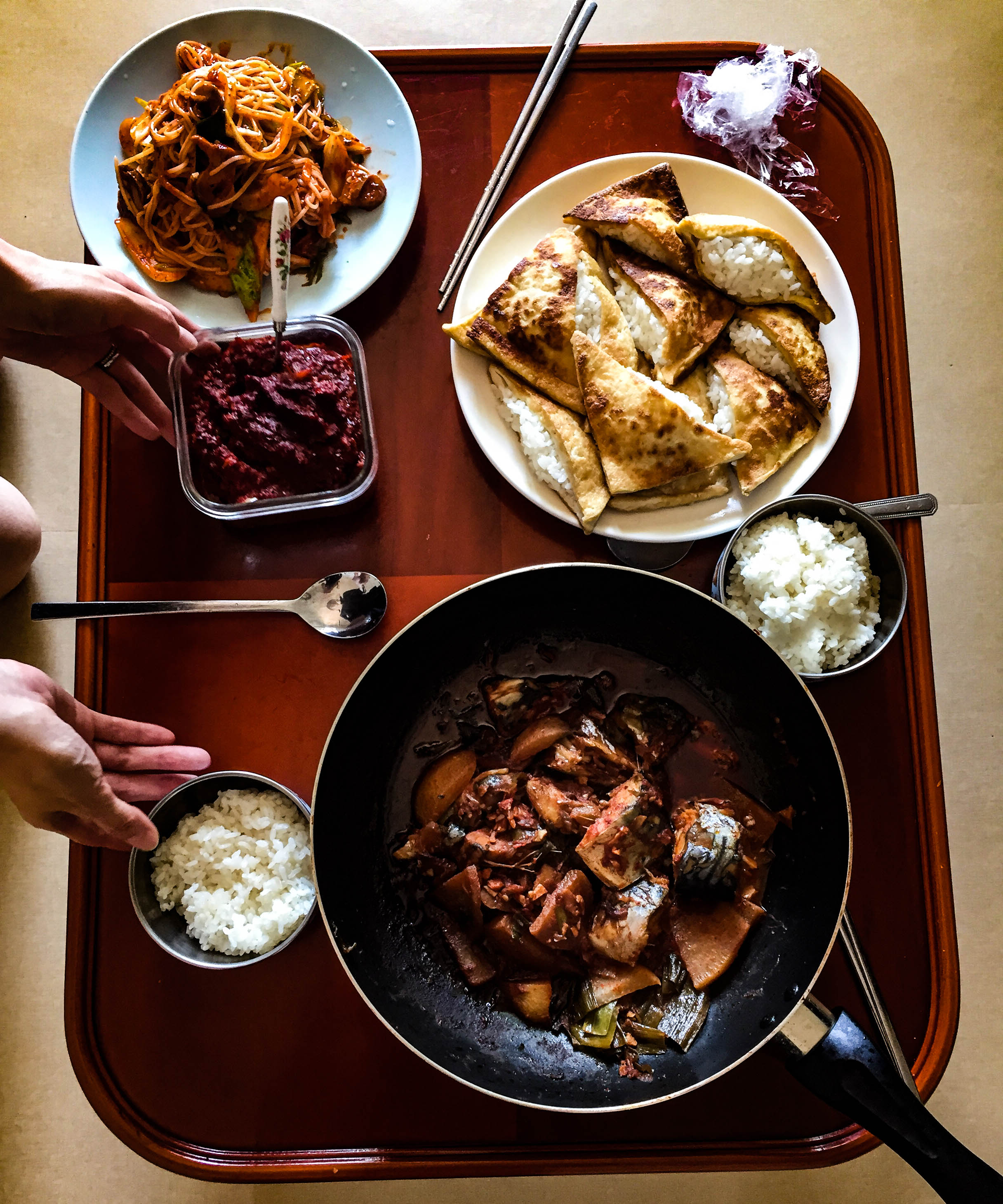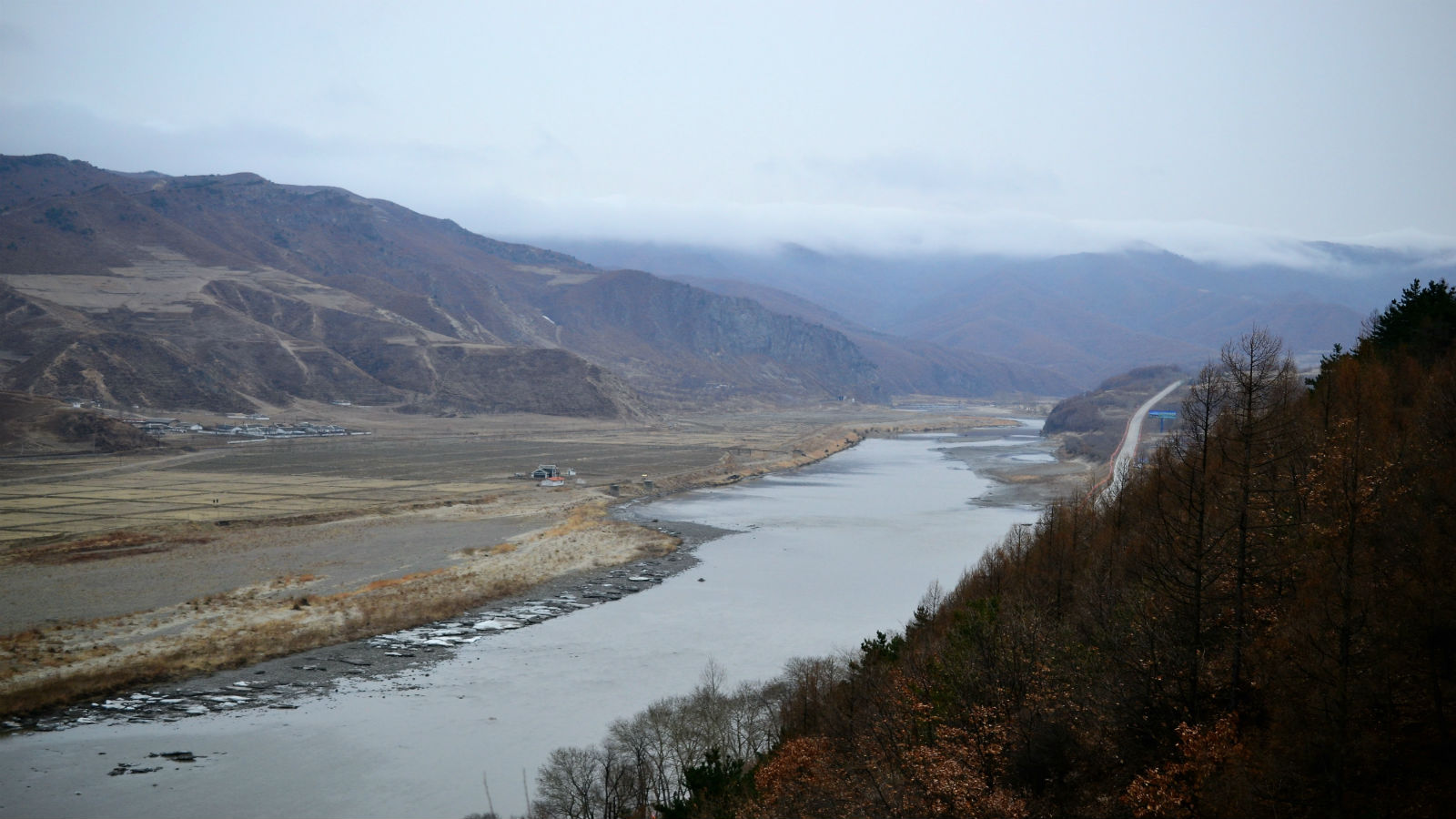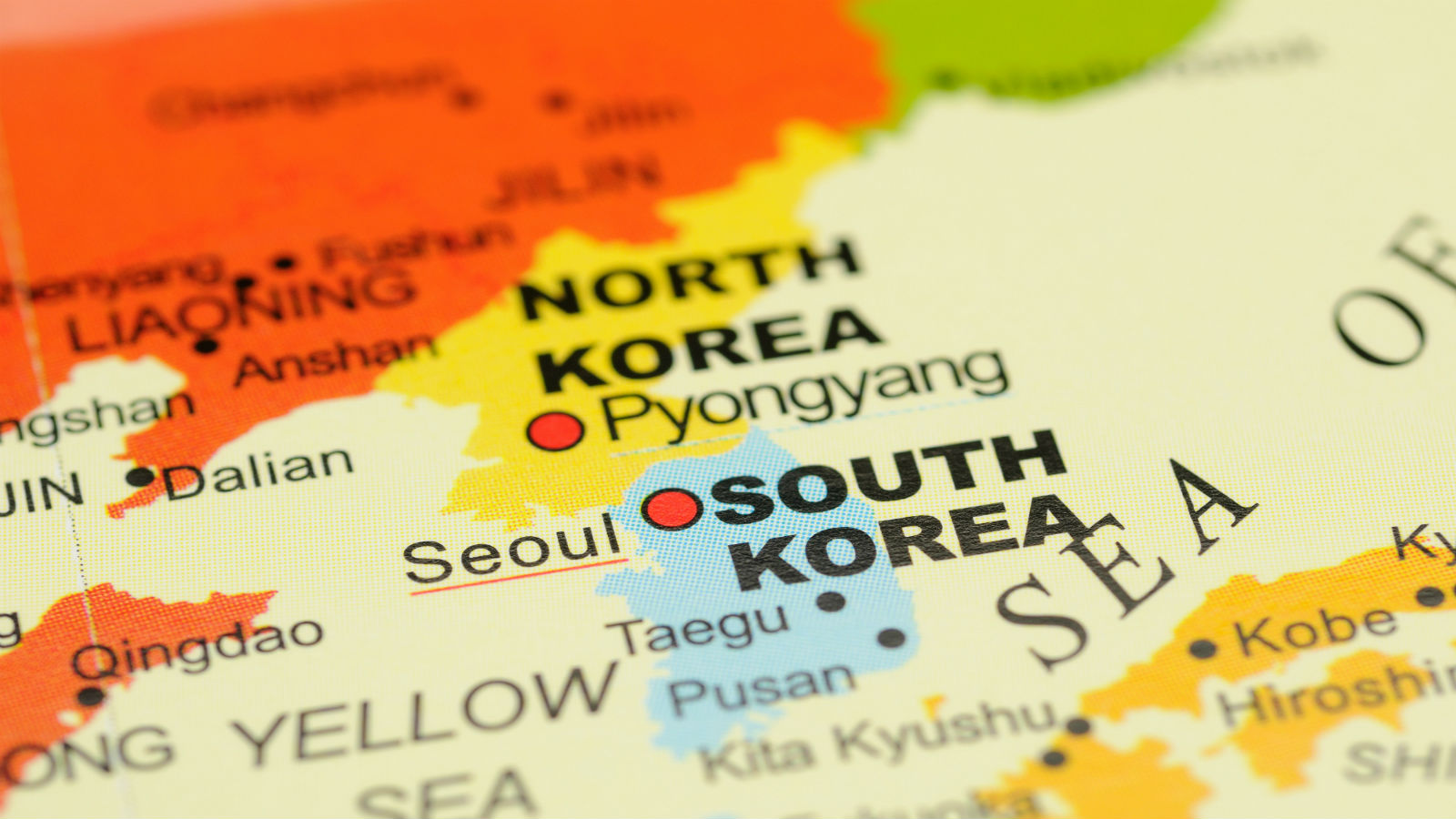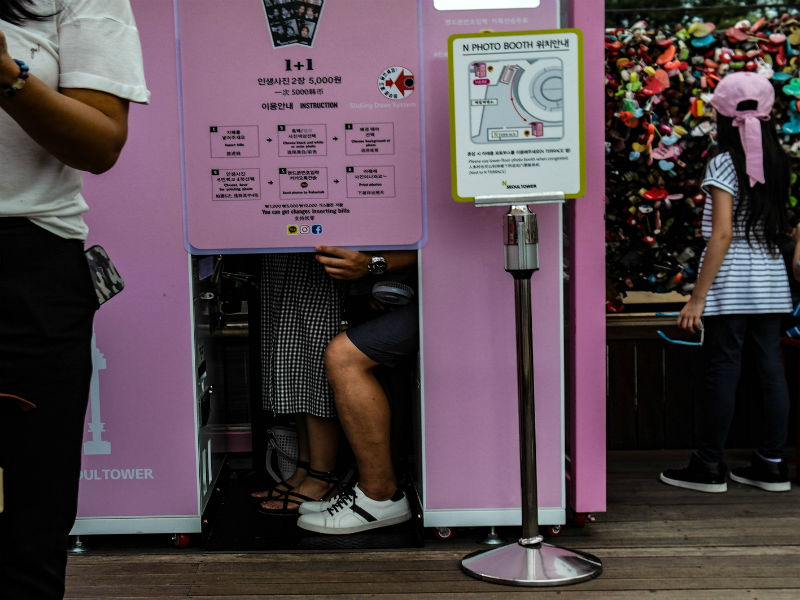Yeju’s
Story
Lee Yeju, 31, opens up a window to let out steam from the rice cooker. The fragrance of tangy spiced vegetables and sweet rice cakes float from her crowded stovetop and into the humid night air.
A small dog yips at Yeju’s feet, and the television is on full blast, but she ignores the noise. She’s only concerned about getting the flavours for dinner just right. Yeju’s dishes are inspired by recipes from North Korea and China.
A photo of Yeju with a young man hangs on her living room wall.
“My ex-boyfriend,” she says.
When dinner is served, the dog begs for food. Yeju throws the fluffy white dog some apple slices.
“The apples in North Korea are sweeter than the apples in South Korea,” says Yeju.
She throws another slice to the dog and says, “When I buy apples here, it reminds me of North Korea, because apples there are better. My mom used to sell apples.”
Yeju found out recently that her mother was sent to a political prison and she has lost all contact with her. She’s unsure if her own decision to leave North Korea had anything to do with her mother’s imprisonment.

Lee Yeju spent several years in China where she learned how to cook with Chinese spices. She says the food in South Korea isn’t spicy enough for her, so she usually prepares a blend of North Korean and Chinese dishes. [Photo © Ash Abraham]
“My brother died
like a fly in the air”
Yeju didn’t plan on leaving North Korea forever. As a child, she supported Kim Jong-il and didn’t question the regime. She hoped to be a solider like her older brother, and protect her country. All that changed after famine struck North Korea in 1994.
Between 1994 -1997 over three-million people died in the famine known as The Arduous March. Yeju remembers factories shutting down, heavy rains flooding crops and having no electricity.
“A lot of people killed themselves. Some went crazy,” Yeju says. During that time, labourers from the northern provinces attempted to move to Pyongyang to find work. Some starved along the journey, and others died while trying to catch a ride on moving trains.
Lee Yeju talks about the military in North Korea and the loss of her brother. [Video © Ash Abraham, Photo © Will Scott, used with permission]
Yeju’s brother served in the army and died of starvation. “My brother died like a fly in the air,” says Yeju. “Our government said, ‘Oh, you are precious. Precious lives. Everyone is important to the government.’ After he died, I learned that the government was not taking care of its people. We had dreams, but we couldn’t make them come true.”
Yeju says at that time she didn’t care if she lived or died. “People were buried together in one big pit,” she says.
“I wasn’t afraid. You get scared when there’s something to lose, but I had nothing to lose.”
U.S. Senator Tony Hall calls on the U.S. to send more aid to North Korea. [CNN Report, 1994 ]
A few years later, Yeju found a reason to live. She describes the next phase of her life like a romance movie. In her early twenties, she met a young soldier and the two of them fell deeply in love.
“I had boyfriends before, but he was special,” says Yeju. “He shared his future with me.” Yeju recalls an afternoon driving around with her boyfriend. He pulled his car into a gas station. When he stepped out to pay for the gasoline, Yeju was touched. He had to spend money on gas and he had to approve his trip with the local government just to be able to travel to her province. No one had ever done that for her.
“I thought, maybe this is the only time in my life I will feel happy,” says Yeju. “Maybe it won’t happen again. I hoped time would stop.”
Yeju wanted to earn enough money to marry her boyfriend and start a life together. So, she made plans to work illegally in a bordering town in China.
“We loved each other. That’s why I could see a future. I took a risk to go to China and earn money.”
Yeju crossed a river between China and North Korea. She began working in a small convenience store on the border. But after six months of working intense days without breaks, Yeju realized she wasn’t saving money. She decided to come back home.

The Tuman River is where many North Koreans defect. Most refugees come from border towns in North Korea. They typically leave during winter months, when the river freezes over. [Photo © Adobe Stock]
Yeju called her mother to explain that she would be returning. Her mother’s voice was distraught on the other end of the telephone. She instructed Yeju not to leave China.
While Yeju was working in China, there was an election in North Korea. Every North Korean had to vote in the election. When Yeju heard the news, she was completely heartbroken.
“It was dangerous for me to go back to North Korea,” Yeju says. “My mom told me that people were being arrested for not voting. That’s why I couldn’t go back.”
Yeju could not say goodbye to her boyfriend or mother. She could see her hometown from the border town in China, but could not return.

Journey south
Over the next four years, Yeju tried to make a life for herself in China. She saw a number of North Korean people get arrested and repatriated back to North Korea. She had never considered defecting to South Korea, but now in China where she lacked identification and faced the constant threat of arrest, she had no choice. Yeju and several of her North Korean friends travelled via the ‘underground railroad’ through southern China, the jungles of Laos and into Thailand. The journey took about two months.
“There was a river we crossed from China into Thailand. It was very dirty, and I almost drowned,” she remembers.
When Yeju reached Thailand, her friends all spread out into the jungle looking for police. Defectors want to get arrested so they will be taken to an immigration detention centre. At the centre there are lawyers who help North Korean defectors apply for asylum. After receiving asylum to South Korea, Yeju thought, “In China I had friends, but I how will I survive in South Korea?”
After what became known as “The Miracle on the Han River,” South Korea’s economy transformed. In less than 30 years South Korea went from a developing nation to a competitive word player. Pictured here is a market in South in the 1940s, and the Myeongdong market of today. According to Yeju, the markets of North Korea more closely resemble a market from a bygone era instead of the bustling markets of Seoul. [Before Photo © Center for Korean Studies, used with permission] After Photo © Ash Abraham]
Relationships in South Korea
Yeju was surprised to encounter people at the women’s resettlement centre or Hanawon who travelled with their children. Seeing so many women who had risked their lives to be in Seoul encouraged her to have a better attitude about the prospect of living in South Korea.
After Yeju graduated from the Hanawon, she moved into a small apartment provided to her by the government. She was relieved to have her own place, but it was dark and grimy.
“I was depressed, because of this situation,” she says. At first she couldn’t get out of bed, because of exhaustion. Finally, she motivated herself to write up a resume, and found a job working in a clothing store.
“Because I had a strong accent people gave me strange looks. I tried so hard to change my accent,” she remembers.
Dreaming of
North Korea
Making friends has been easy for Yeju, because she embraces the fact that she is different from South Koreans.
But these days Yeju hopes to find more than a friend. She is at an age where everyone in South Korea gets married, and she hopes for a husband.
She has had to accept permanent separation from her North Korean boyfriend. Since moving to Seoul, they lost contact. She’s not sure where he is now.
It is difficult for Yeju to find a partner in South Korea. She has gone on countless failed dates. Her last South Korean boyfriend – the man whose image still hangs on her wall – broke up with her after she opened up about her life in North Korea. She thinks it’s impossible for South Korean people to understand the kind of grief she has endured.
Although she despises the North Korean regime, when times are difficult, Yeju dreams about smuggling herself back to North Korea.
“In my dreams I think about my hometown,” she says. “I have dreamed several times that I went back to see my mom.”
She reflects on the death of her brother, separation with her boyfriend and her mother’s incarceration.
“The regime took everything from me,” Yeju says. “And there’s no solution when I get sad and miss home.” To future North Korean refugees, her advice is: don’t come. The road to South Korea is dangerous, and she believes there is some merit in staying and working in North Korea’s black markets.
“Sometimes, I feel like the life here in South Korea is tougher than North Korea. If my friend wanted to come, I would ask her to reconsider.”

At the top of Seoul tower, couples take photos and lock love locks on the fence. [Photo © Ash Abraham]